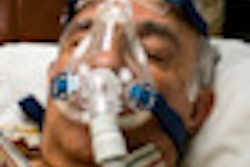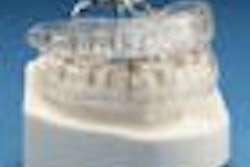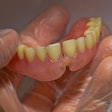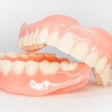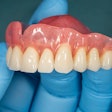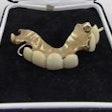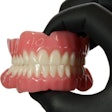
Previous studies have speculated that there may be an association between edentulism and worsening obstructive sleep apnea (OSA), but research presented at the recent American Association for Dental Research annual meeting did not find a link.
"We came across some papers stating that individuals who slept in their complete dentures had an improvement in their OSA," study author Jeff Tanner, DDS, an oral and maxillofacial surgery resident at the University of California Los Angeles (UCLA), told DrBicuspid.com. "Their assumption was that tooth loss/edentulism contributes at least in part to the worsening of OSA."
When people become edentulous, several physiological changes take place, Dr. Tanner noted. For example, the vertical dimension of occlusion reduces, the tongue grows larger because of the space that is no longer occupied by teeth, the position of the tongue changes, and the tongue rests in a different position.
Since no prior study has ever examined whether or not tooth loss per se was a predictor of OSA, the researchers decided to investigate this connection.
"When we became interested in this topic we found that there were several publications that had dealt with this issue, but not so directly," he said during the session.
VA health system data
Dr. Tanner and his colleagues hypothesized that people with fewer teeth -- especially those who are edentulous -- have more serious OSA after controlling for age and body mass index (BMI), which are known predictors of OSA.
— Jeff Tanner, DDS
They conducted a retrospective chart review of patients from the greater Los Angeles U.S. Department of Veterans Affairs (VA) health system who were referred to the dental service for treatment of OSA. The researchers looked at the electronic medical records of 210 male veterans who had already undergone a sleep study at the VA hospital and were able to collect the age and BMI of these patients. The researches also used an apnea-hypopnea index to classify the severity of the patients' OSA.
They then used panoramic radiographs to quantify teeth using three different methods: total teeth lost, mandibular teeth lost, and posterior dental functional units lost.
Here are the key results:
- Of the 210 subjects, 25.5% had not lost any teeth, 36.6% lost one to five teeth, 20.8% lost six to 16 teeth, and 17.1% lost more than 16 teeth.
- 30% of the individuals had mild OSA, 36% moderate OSA, and 34% severe OSA.
- The bivariate association between the number of dentition present and severity of OSA showed no significance.
- In multivariate analysis, age and BMI were significant predictors of OSA severity, while total teeth loss was not significant
"The degree of tooth loss is not associated with OSA severity," the authors concluded. "Tooth loss does not worsen OSA. "
More research needed
OSA is difficult to understand because of the causative factors, Dr. Tanner told DrBicuspid.com.
Age and obesity are proven predictors so the study controlled for those variables; however, the authors were still not able to prove that tooth loss predicted a worsening of OSA, he noted.
This line of research could be improved by obtaining a sleep study on the same individual prior to edentulism, after edentulism, and wearing complete dentures, Dr. Tanner added.
"Only by conducting this type of study will we be able to be certain to state whether or not tooth loss predicts OSA," he said. "If in the future it could be stated that edentulism worsens OSA, it would be a strong case for dentists to attempt to restore patients back to a dentate state with implants which maintain alveolar ridge height unlike dentures."
Given that OSA is an epidemic that is just now catching the public's attention, "This connection would be huge, as that type of treatment would be medically driven dentistry, possibly covered by medical insurance," he concluded.





